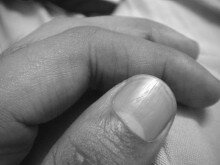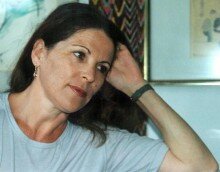
Rae Armantrout, one of the founding members of the West Coast group of Language poets, stands apart from other Language poets in her lyrical voice and her commitment to the interior and the domestic. Her short-lined poems are often concerned with dismantling conventions of memory, pop culture, science, and mothering, and these unsparing interrogations are often streaked with wit. “You can hold the various elements of my poems in your mind at one time, but those elements may be hissing and spitting at one another,” notes Armantrout.
According to critic Stephen Burt, “William Carlos Williams and Emily Dickinson together taught Armantrout how to dismantle and reassemble the forms of stanzaic lyric – how to turn it inside out and backwards, how to embody large questions and apprehensions in the conjunctions of individual words, how to generate productive clashes from arrangements of small groups of phrases. From these techniques, Armantrout has become one of the most recognisable, and one of the best, poets of her generation.”
The author of several collections of widely anthologised poetry, Armantrout has also published a short memoir, True (1998). Her Collected Prose was published in 2007. A California native, Armantrout earned her BA at UC Berkeley – where she studied with Denise Levertov – and she received her MA at San Francisco State. She is a professor and director of the New Writing Series at UCSD.
“I think my poetry involves an equal counterweight of assertion and doubt,” Armantrout has written. “It’s a Cheshire poetics, one that points two ways then vanishes in the blur of what is seen and what is seeing, what can be known and what it is to know. That double-bind.”
Armantrout’s poems are often described as works of great restraint and care, their short lines packed with metaphors that carry multiple meanings. Diagnosed with adrenal cortical cancer in 2006, many of her most recent pieces are driven by the struggle to accept and fight her illness. A single stanza in ‘Procedures’ is: “To start over/in the carved moment/is to take cover”, which can be read many ways, despite the breaks. She seems to be alluding to an operation on her body, one that also resulted in the a permanently changed inner life.
“We send the body on a mission . . . The body is catching flak/or flies” she observes in ‘Outage’. We do not have much control over ourselves, over what happens to our bodies, in the end. Despite even the best that we can do, a good diet and regular exercise, disease can still come without warning. And death eventually comes for everyone, anyway. ‘Fact’ declares: “Each material/fact/is a pose,//an answer/waiting to be chosen.//‘Just so,’ it says.//‘Ask again!’”
Bibliography
Poetry
Extremities, The Figures, Great Barrington, 1978
The Invention of Hunger, Tuumba, Berkeley, 1979
Precedence, Burning Deck, Providence, 1985
Couverture, Les Cahiers de Royaumont, Royaumont, 1991
Necromance, Sun and Moon Press, Los Angeles, 1991
Made To Seem, Sun and Moon Press, Los Angeles, 1995
writing the plot about sets, Chax, Tucson, 1998
Veil: New and Selected Poems, Wesleyan University Press, Wesleyan, 2001
The Pretext, Green Integer, Los Angeles, 2001
Up to Speed, Wesleyan University Press, Wesleyan, 2004
Next Life, Wesleyan University Press, Wesleyan, 2007
Versed, Wesleyan University Press, Wesleyan, 2010
Translations
Narrativ, luxbooks, Wiesbaden, 2009
Prose
True, Atelos, Berkeley, 1998
Collected Prose, Singing Horse Press, San Diego, 2007
The Grand Piano: An Experiment In Collective Autobiography, Mode A/This Press, Detroit, 2007
Link
Interview with Rae Armantrout from Jubilat, issue 18









